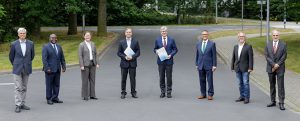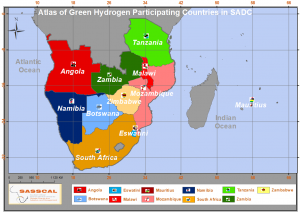
Pictured during the launch of the H2Atlas-Africa project: (from left) Prof. Harry Vereecken (Director of the Institute for Bio and Earth Sciences, Agrosphere), Dr. Solomon Agbo (project Coordinator), Dr. Heidi Heinrichs (Institute for Energy and Climate Research, Techno-Economic Systems Analysis), Thomas Rachel (Parliamentary State Secretary), Prof. Wolfgang Marquardt (Chairman of the Board), Prof. Detlef Stolten (Director Institute for Energy and Climate Research, Techno-Economic Systems Analysis), Dr. Wilhelm Kuckshinrichs (Head of the Institute for Energy and Climate Research, Systems Research and Technological Development) and Prof. Uwe Rau (Institute for Energy and Climate Research, Photovoltaics).
https://www.fz-juelich.de/SharedDocs/Pressemitteilungen/UK/DE/2020/2020-06-08-wasserstoff.html
Copyright: Research Center Jülich / Ralf-Uwe Limbach
The H2Atlas-Africa project was officially launched on 10 June 2020 in Jülich. The project funded by the Germany Federal Ministry of Education and Research (BMBF) for about 5.7 million euros was given a go-head by Thomas Rachel, Parliamentary State Secretary. https://youtu.be/njNhuTI93QU
The aim of the H2Atlas-Africa project is to strengthen and support the region’s capacity for a viable hydrogen economy. Such an economy will contribute to its sustainable development. It will also enable the region to participate in the international energy markets allowing it to diversify its economies. The immediate outcome of the project will be an interactive atlas, showing identified Green Hydrogen hotspots. It is envisaged that such a map will provide evidence-based information for policy-makers, researchers, and potential funders about the potential of a Green Hydrogen economy in the region. Partnerships and collaborations will play an important role in the development of this Green Hydrogen economy.
The two main partners in Africa are the West African Science Service Centre for Climate Change and Adaptive Land Management (WASCAL) and the Southern African Science Service Centre for Climate Change and Adaptive Land Management (SASSCAL). SASSCAL’s Executive Director, Dr Jane M. Olwoch in her online address painted a very vivid picture of the long-term benefits of such a project. She thanked and congratulated BMBF for funding the project. This success, she stated, can only be realised through very strong partnerships between nations that are otherwise separated by many factors such as physical barriers, and social and economic factors. Dr Olwoch further reiterated SASSCAL’s commitment to the successful implementation of this project in 11 countries in SADC.

H2Atlas-Africa project’s participating countries in SADC
SASSCAL has identified the Southern African Development Community (SADC) Centre for Renewable Energy and Energy Efficiency (SACREEE) as a key player to this implementation. An MoU has since been signed between SASSCAL and SACREEE. The two institutions share the need to further strengthen the climate change – energy nexus in the region.




